
Research strongly suggests that ketamine may be a breakthrough medication for people who have been living with severe cases of depression and other acute mental health disorders. In today’s post, we take a closer look at how this substance works. In other words, we attempt to answer the question, what does ketamine do to your brain?
What Is Ketamine?
Ketamine is a powerful drug that is classified as a dissociative analgesic. It is also typically included in the informal category of recreational substances known as club drugs.
A derivative of phencyclidine, ketamine was first synthesized in the 1960s. It was originally approved by the U.S. Food and Drug Administration in 1970. Ketamine’s initial approval was as a surgical anesthetic. It was often used for this purpose by U.S. military personnel during the Vietnam War.
Through the years, it has continued to be used as an anesthetic, though its dissociative properties have also made it a popular substance among people who are seeking a certain type of recreational high. Unfortunately, ketamine’s ability to induce both disorientation and amnesia has also been put to use by predators who surreptitiously give the drug to potential victims before assaulting them.
Recently, research has documented ketamine’s effectiveness at alleviating certain mental health symptoms. In 2019, the FDA approved Spravato, a nasal spray that contains a ketamine variant called esketamine, for people who have treatment-resistant depression.
When ketamine is used in medical or clinical procedures, it is often administered via intravenous (IV) or intramuscular (IV) injection. People who abuse ketamine often take it in tablet, powder, or liquid form.
How Does Ketamine Work in the Brain?
The November-December 2018 edition of the Harvard Review of Psychiatry contained a review of previously published research that focused on what does ketamine do your brain. This review, which was led by experts from Harvard Medical School and Massachusetts General Hospital, included 47 papers, most of which involved neuroimages of the brains of individuals with treatment-resistant depression.
The review team’s findings included the following:
- One study that used functional magnetic resonance imaging (fMRI) reported that ketamine promoted greater connectivity and increased neural responses in an area of the brain known as the right caudate.
- Another study involving fMRI found that ketamine increased global connectivity in the right prefrontal cortex (or PFC), an area that influences thoughts, emotions, and behaviors.
- Studies that used positron emission tomography (PET) scans found that ketamine prompted increased activity within the hippocampus (which is associated with memory formation and retrieval) and the dorsal anterior cingulate cortex, or ACC (an area that is involved in motor skills and cognition)
- Research that used MRIs on people who did not have depression found that ketamine reduced cerebral blood flow in the hippocampus, but increased it in the ACC and the prefrontal regions of the brain.
“Overall, ketamine’s effects were most notably found in the [subgenual anterior cingulate cortex], [posterior cingulate cortex], PFC, and hippocampus,” the review team wrote. “These areas overlap with the growing body of neuroimaging literature that implicates abnormalities of certain brain networks in the pathophysiology of depression.”
What Mental Health Disorders Can Ketamine Treat?
Clearly, research that explores what does ketamine do to your brain is quite complex. For those who are not particularly well versed in the intricacies of the human brain, it may be easier to grasp ketamine’s impact by looking at the types of disorders it is being used to treat – and how it is improving life for people who have these disorders.
As we noted earlier on this page, the FDA’s 2019 approval of Spravato (esketamine) involved the use of this medication for treatment-related depression, or TRD. Though there is no universal standard for TRD, most experts define this condition as major depressive disorder with symptoms that have not improved after two separate medication regimens.
In May 2023, the New England Journal of Medicine published a study that found ketamine treatment was as effective as electroconvulsive therapy (ECT) at treating people with severe cases of depression. In this study, which involved 403 subjects, more than half of those who received ketamine reported a decrease in symptoms and an increase in overall quality of life, with no significant side effects.
At the moment, esketamine has FDA approval only for treatment related depression, and ketamine is authorized only as an anesthetic. However, many healthcare providers have been prescribing these medications on an off-label basis for other mental health concerns. Also, researchers are continuing to investigate how ketamine may be able to help people who have concerns such as:
- Anxiety disorders
- Bipolar disorder
- Posttraumatic stress disorder (PTSD)
- Suicidal ideation
- Psychosis
- Dual Diagnosis Disorders
- Obsessive-compulsive disorder (OCD)
Find Ketamine Treatment in Atlanta, GA
If you have been seeking ketamine therapy for treatment-resistant depression, Atlanta Integrative Psychiatry may be able to help. Our mental health treatment center in Atlanta, Georgia, offers a dynamic array of evidence-based services to help adults whose lives have been disrupted by depression and other conditions. At Atlanta Integrative Psychiatry, you will work in active collaboration with a team of experts who are committed to providing superior care and compassionate support.
To learn more about ketamine treatment or any other aspect of our programming, or to schedule a free assessment, please visit our admissions page or call us today.





